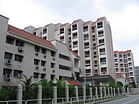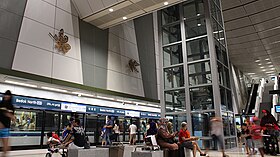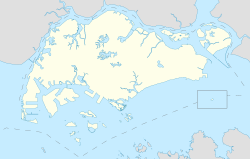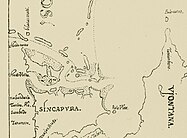Bedok
Bedok | |
|---|---|
| Other transcription(s) | |
| • Chinese | 勿洛 Wùluò (Pinyin) Bût-lo̍k (Hokkien POJ) |
| • Malay | Bedok |
| • Tamil | பிடோக் Piṭōk (Transliteration) |
From top left to right: The shores of Bedok Reservoir, Bedok Stadium, Bedok Reservoir Estate, Bedok Mall, Bedok Bus Interchange, Bedok North MRT station | |
 Location of Bedok in Singapore | |
 Location of Bedok in Singapore | |
| Coordinates: 1°19′24.96″N 103°55′38.42″E / 1.3236000°N 103.9273389°E | |
| Country | |
| Region | East Region
|
| CDCs | |
| Town councils |
|
| Constituencies | |
| DGP exhibited |
|
| PA incorporated |
|
| Government | |
| • Mayors | North East CDC
South East CDC |
| • Members of Parliament | Aljunied GRC East Coast GRC Marine Parade GRC |
| Area | |
• Total | 21.69 km2 (8.37 sq mi) |
| • Rank | 7th |
| • Residential | 4.18 km2 (1.61 sq mi) |
| Population | |
• Total | 276,840 |
| • Rank | 2nd |
| • Density | 13,000/km2 (33,000/sq mi) |
| • Rank | 11th |
| Ethnic groups (2020) | |
| • Chinese | 201,770 (72.9%) |
| • Malays | 39,300 (14.1%) |
| • Indians | 24,450 (8.9%) |
| • Others | 11,470 (4.1%) |
| Postal district | 16 |
| Dwelling units | 60,115 |
| Projected ultimate | 79,000 |
Bedok (IPA: /bəˈdoʊk/ bə-DOHK) is a planning area and residential town located in the geographical region of Tanah Merah along the south-eastern coast of the East Region of Singapore. Bedok is bounded by five other planning areas: Paya Lebar to the north, Hougang to the northwest, Tampines to the northeast and east, Geylang to the west and Marine Parade to the southwest. It also shares a maritime boundary with the Singapore Strait to the south and southeast.
Bedok has a rich history, with evidence of human settlement dating back to the 14th century. The area was originally a fishing village and agriculture centre, but it has transformed into a bustling residential and commercial hub over the years. Today, Bedok is known for its vibrant and diverse community, with a mix of public and private housing options, shopping centers, parks, and a thriving food scene.
In addition to its commercial development, Bedok also boasts several green spaces and parks, including Bedok Reservoir Park and East Coast Park, providing residents with ample opportunities for recreation and relaxation. The area is also well-connected to the rest of the city, with a number of transportation options, including MRT stations, bus routes, and major expressways, making it an accessible and convenient location for residents and visitors alike.
Population wise, Bedok is the largest planning area in the country, being home to approximately 280,000 residents.[2][5] This high demographic is largely explained by the affordable public housing in Bedok New Town, due to its relatively distant location from the Central Area. Besides public housing developments, private residences are also prevalent in the area, most of which are found in the neighbourhoods of Bayshore, Frankel Avenue and Siglap, in western and southwestern Bedok.[6][7]
Overview
Etymology
The origin of the name "Bedok" likely comes from the Malay word for "drum", a reference to the sound of drums heard in the area during traditional festivals and ceremonies.[8] Its use was known as early as 1604 in Manuel Godinho de Erédia's map of Singapore. The map refers to the Bedok River (present-day Sungei Bedok) as Sune Bodo.
History
As part of the Tanah Merah region, Bedok's history is largely influenced by its coastal frontier. The general area known as Bedok today was first mentioned in maps dating to the pre-Raffles era. After Singapore was colonised by the British in 1819, Simpang Bedok Village became an ethnically mixed community consisting of Chinese and Malay peoples. Before the 1960s, Bedok's primary source of income was coconut, which was harvested from the plantations found in the Siglap subzone. Fishing was another primary source of income for the villagers of Simpang Bedok at the time.[7][9]
The modern development of Bedok only began in 1966, when reclamation works along the coastal area began.[9] In the following decade, Bedok was transformed by the Housing and Development Board (HDB) into the country's fifth self-contained new town, with the first residential flats emerging in the vicinity by 1975.[10] Following the Fall of Saigon that same year, Bedok Jetty became a focal point for Vietnamese refugees landing in Singapore during Operation Thunderstorm.
Bedok Town had been developed since 1973, with the newer roads such as Bedok Plain, Bedok Highway, and Bedok Heights being built until 1975. The New Upper Changi Road was fully built and opened in 1979, where the massive development had been completed except Bedok Reservoir and Kaki Bukit, which was built later between 1983 and 1988.
Geography
Location
Bedok Planning Area is located within the East Region of Singapore, along Pulau Ujong's southeastern coast. It is bounded by Paya Lebar to the north, Hougang to the northwest, Tampines to the northeast and east, Geylang to the west, and Marine Parade to the southwest.
Bedok New Town sits within the Bedok Planning Area.
Subzones
Bedok is divided into 8 subzones:
| Name of estates | Location | Notable structures | Accessibility |
|---|---|---|---|
| Bayshore | Areas along Bayshore Road | East Coast Park, Upper East Coast Bus Terminal, Bedok Jetty, Temasek Secondary School as well as the Bayshore MRT station, Bedok South MRT station (U/C) and Sungei Bedok MRT station (U/C) | Bayshore MRT station and buses |
| Bedok North | Areas along Bedok North Road | Tanah Merah MRT station, Bedok MRT station, Bedok Bus Interchange, Bedok Town Centre, Bedok Stadium, Bedok Swimming Complex, Bedok Tennis Centre, Bedok Sports Hall, Bedok Mall, Bedok Point, Bedok Public Library, Bedok Polyclinic, Seu Teck Sean Tong Yiang Sin Sia, Kampong Chai Chee Community Centre, Fengshan Community Club, Fengshan Primary School, St Anthony's Canossian Primary & Secondary School | Tanah Merah MRT station, Bedok MRT station and buses |
| Bedok Reservoir | Areas surrounding Bedok Reservoir | Bedok Town Park, Bedok Reservoir, Bedok Reservoir Park, Damai Primary School, Damai Secondary School and Bedok Reservoir MRT station | Buses and Bedok Reservoir MRT station |
| Bedok South | Estates along Bedok South Road | Bedok Community Centre, Bedok Green Primary School, Bedok View Secondary School, Bedok South Secondary School, Temasek Primary School, Temasek Junior College and Yuan Meng Shih Temple | Buses |
| Frankel | Areas along Telok Kurau Road and Siglap Road | Telok Kurau Park, Opera Estate Primary School, CHIJ (Katong) Primary School, Saint Patrick's School, 124 and 126/126A St. Patrick's Road | Kembangan MRT station, Marine Terrace MRT station and buses |
| Kaki Bukit | Northwest Bedok | Kaki Bukit Industrial Estate, Eunos Community Club, Kaki Bukit MRT station and Bedok North MRT station | Buses, Kaki Bukit MRT station and Bedok North MRT station |
| Kembangan | Areas around Kembangan MRT station and Chai Chee Estate | Kembangan MRT station, Kampong Kembangan Community Club, The Buddhist Union, Hong San Si Temple, Kampong Kembangan Neighbourhood Police Post, Chai Chee Neighbourhood Police Post, Chai Chee Fire Post, Bedok South Neighbourhood Police Centre, Chai Chee United Temple, NPS International School and Ping Yi Secondary School | Kembangan MRT station and buses |
| Siglap | Areas along Marine Vista and Siglap Link | East Coast Park, Victoria School, Victoria Junior College, Ean Keng Si Buddhist Temple and the Siglap MRT station | Siglap MRT station and buses |
Infrastructure
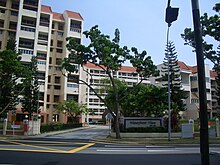
Bedok New Town covers a land area close to 9.4 km2 (3.6 sq mi) with some 42% occupied for residential use. It was formerly a hilly region, and hence the focal point of orientation of the town is the special landscaped park and sports complex built on the higher ground of the town. The residential blocks, as well as the industrial area, are planned based on the neighbourhood concept. There is also a town centre situated between the present Bedok Mall and the former Bedok Point site. Plans for an integrated complex, which will be as big as three football fields, have also been revealed in 2014. This complex, Heartbeat @ Bedok, houses a sports centre, library, clinic, centre for the elderly, and the Kampong Chai Chee Community Club. The complex is located in the Bedok Town centre and was completed in 2017.
Residential development
Some 58,000 units of flats were built by the HDB in Bedok New Town. As one of the older towns, the majority of the flats are 3-room or 4-room. There are also some 2,700 and 583 units of executive and Housing and Urban Development Corporation flats. It provides housing for some 200,000 residents.
Transportation


There are currently nine Mass Rapid Transit stations in the Bedok planning area across three lines, the East West line, the Downtown line and the Thomson–East Coast line. Three lines run parallel to one another and do not have an interchange station in Bedok. However, the Tanah Merah MRT station of EWL is an interchange station with the Changi Airport branch line (CG). The nine stations are:
The future stations of the Thomson-East Coast line that are currently under construction will be operational in 2025 under stages 5. The line will run south of the planning area and have an interchange station with the Downtown line at Sungei Bedok station, which will also be the terminus for both lines. The two future stations are:
The Bedok Bus Interchange opened in 1979, as part of the Bedok Town Centre, located along Bedok North Road and between Block 203 and 207, next to community amenities such as a food centre, library, and sports complex, with the allocated Block 207A. There were thirty-three end-on berths with ten services occupying it and six sawtooth berths, each occupying three bus services in the original facility. Several bus services were moved to the interchange from Chai Chee Bus Terminal when it closed in 1985.[11] Bedok MRT station opened in 1989 at the south of the original facility, complementing the bus interchange to serve people travelling within Bedok town and also the nearby East Coast Park.
On 19 November 2011, after operating from the original facility for 32 years, the bus interchange moved to its temporary facility west of the original facility, at the junction of Bedok North Drive and Bedok North Avenue 1, to allow the original facility to be redeveloped into Bedok Mall.
The new Bedok Integrated Transport Hub (ITH) began operations on 30 November 2014.[12][13] It is the 7th air-conditioned bus interchange in Singapore.[12]
Parks

The parks in the area include Bedok Town Park, located beside the Pan Island Expressway between Bedok North Road and Bedok Avenue 3,[14] and the 41.7 hectares (103 acres) Bedok Reservoir Park alongside Bedok Reservoir.[15]
Bedok Town Park park has been designated with the code 9V-0005 by the international Parks On The Air award program, and so is regularly 'activated' by Amateur Radio operators using portable equipment.
Politics
The area of Bedok falls under three constituencies and nine divisions following the 2020 elections, which were Aljunied GRC, East Coast GRC, and Marine Parade GRC.
The Aljunied GRC covers northern Bedok along with the subdivisions of Kaki Bukit and Bedok Reservoir; its MPs were the secretary-general of the Workers' Party (WP) Pritam Singh, former NCMP Gerald Giam and Muhamad Faisal Manap, and WP had held on to the constituency since the 2011 election where it was first led by then-secretary general Low Thia Khiang. Before 2011, Aljunied GRC was under the ruling People's Action Party (PAP) with MPs former Foreign Minister George Yeo and Zainul Abidin, while Kaki Bukit was under the Marine Parade GRC where Muhammad Faishal Ibrahim represented the ward back then (now as MP for Nee Soon GRC).
The East Coast GRC covers the central Bedok area, east Siglap, and Bayshore; its MPs are Deputy Prime Minister Heng Swee Keat (an ex-Tampines GRC anchor minister), Jessica Tan Soon Neo, Cheryl Chan, minister Maliki Osman, and Minister of State Tan Kiat How. East Coast GRC has been staged as closed fights against the WP since the 2011 election, but the PAP won the GRC in a narrow margin. Its previous MPs include cabinet ministers such as Lee Yock Suan, S. Jayakumar, Raymond Lim and Lim Swee Say, as well as previous speakers Tan Soo Khoon and Abdullah Tarmugi. For the 2015 election, Chan's ward of Fengshan was carved as an SMC for only one term before reverting to GRC.
The Marine Parade GRC covers Frankel, Kembangan, and west Siglap; its MPs are current Speaker Tan Chuan-Jin and Minister Edwin Tong. Tong's ward of Joo Chiat was a SMC for three elections beginning in 2001 until it was absorbed into a GRC in 2015.
Education
The following is the list of schools in Bedok as of 2024:
Primary schools
- Bedok Green Primary School
- Damai Primary School
- Fengshan Primary School
- Opera Estate Primary School
- Red Swastika School
- St. Anthony's Canossian Primary School
- St. Stephen's School
- Telok Kurau Primary School
- Temasek Primary School
- Yu Neng Primary School
Secondary schools
- Anglican High School
- Bedok Green Secondary School
- Bedok South Secondary School
- Bedok View Secondary School
- Damai Secondary School
- St. Anthony's Canossian Secondary School
- Temasek Secondary School
Junior colleges
Other schools
- Katong School (APSN)
- NPS International School
Hawker Centres
As of 2020, 10 major hawker centres are located in Bedok that serves local Singaporean cuisine. They are:
- Fengshan Market & Food Centre
- Bedok Interchange Hawker Centre
- Blk 216 Bedok Food Centre & Market
- Kaki Bukit 511 Market & Food Centre
- Bedok 538 Market & Food Centre
- Blk 16 Bedok South Market & Food Centre
- The Marketplace @ 58
- Bedok Food Centre
- The Bedok Market Place
- Blk 630 Bedok Reservoir Market & Food Centre
References
- ^ a b "Singapore Infopedia – Development guide plan". National Library Board.
- ^ a b c "Singapore: Subdivision (Planning Areas and Subzones) - Population Statistics, Charts and Map". www.citypopulation.de.
- ^ a b "HDB Key Statistics FY2014/2015". Archived from the original on 4 March 2016.
- ^ "Singapore Residents by Planning Area / Subzone, Age Group, Sex and Type of Dwelling, June 2024". Retrieved 5 January 2025.
- ^ a b "Statistics Singapore - Geographic Distribution - 2018 Latest Data". Retrieved 11 February 2019.
- ^ "Urban Redevelopment Authority Planning Area Brochure – Bedok". Archived from the original on 16 February 2015. Retrieved 5 October 2014.
- ^ a b "Bedok | Infopedia". eresources.nlb.gov.sg.
- ^ "Drumming up an epic theatrical storm - Esplanade Offstage". www.esplanade.com. 14 June 2019. Retrieved 29 January 2023.
A barrel drum and traditional communication tool, this is the instrument used in mosques to initiate the call of prayer. In Singapore, the housing estate of Bedok got its name from this iconic instrument.
- ^ a b "Singapore Infopedia: Bedok land reclamation". National Library Board.
- ^ "Bedok: The birth of a new town". New Nation. 6 July 1976.
- ^ "Chai Chee bus terminal to make way for redevelopment". The Straits Times. 9 September 1985. Retrieved 24 June 2017 – via NewspaperSG.
- ^ a b Ramchandani, Nisha (14 November 2014). "Bedok's new integrated transport hub will open on Nov 30". The Business Times. Retrieved 24 June 2017.
- ^ "New Bedok Integrated Transport Hub To Open IN Fourth Quarter 2014". Land Transport Authority. 5 July 2014. Retrieved 24 June 2017.
- ^ "Bedok Town Park". nparks.gov.sg. National Parks Board. Retrieved 21 August 2022.
- ^ "Bedok Reservoir Park". nparks.gov.sg. National Parks Board. Retrieved 21 August 2022.
External links
- URA Draft Masterplan 2013 Bedok
- Victor R Savage, Brenda S A Yeoh (2003), Toponymics – A Study of Singapore Street Names, Eastern Universities Press, ISBN 981-210-205-1
- From National Library Board Singapore, Infopedia website.
- Chin, Daryl. (, 2014). Bedok residents to get a new sports complex, library, and community club under one roof by 2017. The Straits Times. Bedok residents to get new sports complex, library and community club under one roof by 2017



